Chyngyz Aitmatov
Chyngyz Aitmatov (1928-2008)
Kyrgyz modern writer
Chingiz Aitmatov was a Kyrgyz, Soviet and Central Asian author and statesman, whose fame spread beyond his country’s borders and his books are read with great admiration all over the world. He expressed the ideas of humanism and great love for all living things, including people, wild and domestic animals, plants and for the entire planet Earth.
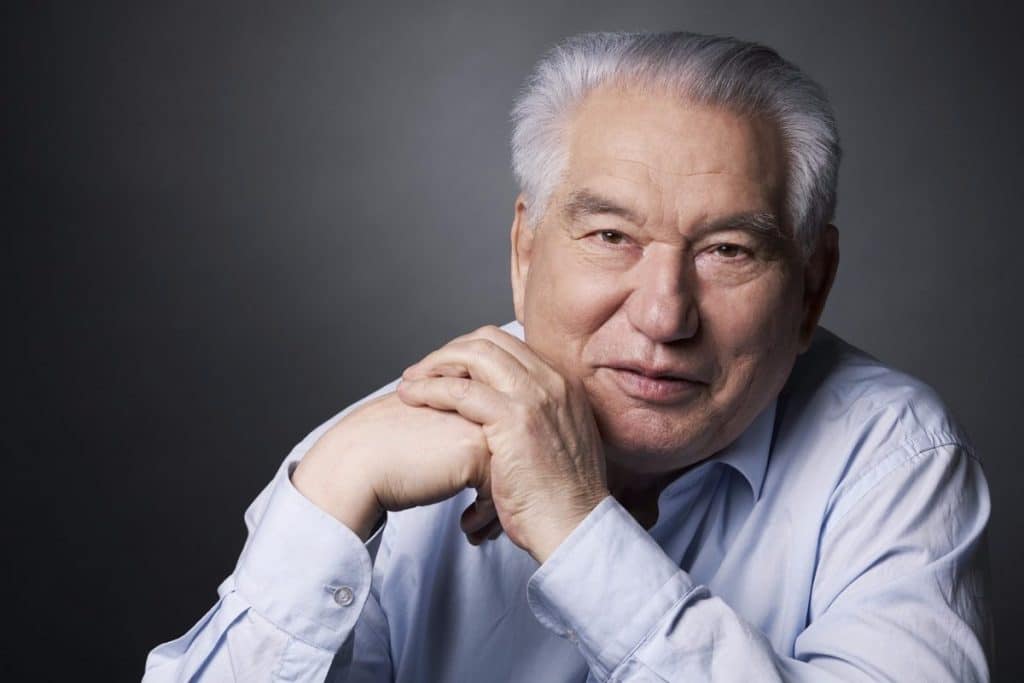
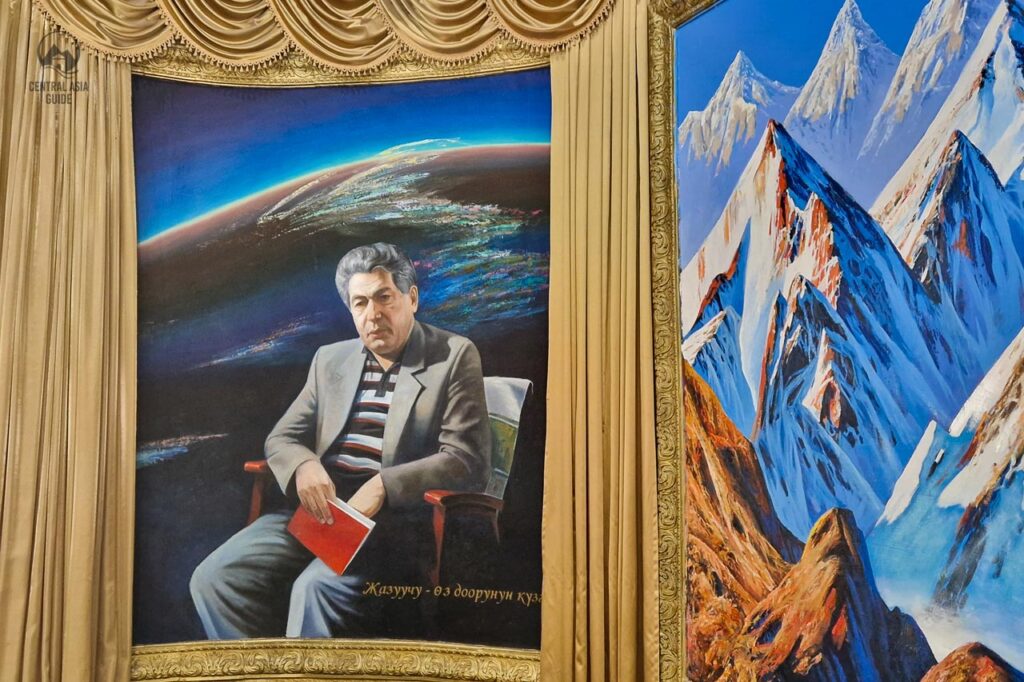
Aitmatov was honored in 1963 with the Lenin Prize for “Tales of Mountains and Steppes” (a collection including “Jamila”, “First Teacher” and “Farewell Gulsary”) and was later awarded a State prize for “Farewell Gulsary!”.
His work is mostly based on folklore which he used in his works to describe contemporary life. Additionally to his literary work, Chinghiz Aitmatov served as ambassador to the EU, NATO, UNESCO, and the BeNeLux countries, first in the Soviet Union and later for Kyrgyzstan.
He wrote in both Kyrgyz and Russian and his works have been translated into more than 150 languages and published in 128 countries around the world with sales of more than 100 million copies.
Aitmatov Biography
Chingiz Torekulovich Aitmatov was born on December 12, 1928, in the family of communists Torekul Aitmatov and Nagima Khamzievna Aitmatova in the village of Sheker, Kara-Buurinsky (Kirovsky) district of the Talas, in the Kyrgyz Autonomous Soviet Socialist Republic. (There is a house museum in the Aitmatov house in Talas where one can see some of his work and other memorabilia.)
After the birth of Chingiz, the family moved to the Talas city due to his father being promoted in 1929 and Torekul Aitmatov’s career therefore being in rapid rise. In 1933, Torokul Aitmatov was already the second secretary of the Kyrgyz Regional Committee. His mother was an ethnic tatar working as an actress in a local theater. The father of the future writer was arrested in September 1937 on suspicion of anti-Soviet nationalist activity and was shot on November 5, 1938.
During the Second World War, all adult men were mobilized and as the fourteen-year-old Chingiz was one of the most literate people in the village and took the post of secretary of the village council. After the war, the young man was able to continue his studies. He graduated with honors from the Dzhambul Zootechnical College and in 1948 entered the Kyrgyz Agricultural Institute in Frunze.
Aitmatov Career
The writer’s writing journey began on April 6, 1952, with the story “The Judo’s Newspaper” published in the newspaper “Komsomolets Kirgizii”. The first literary text Aitmatov wrote in Russian – one of two of his native language. After graduating from the institute in 1953, Chingiz Aitmatov, senior livestock specialist of the Kyrgyz Research Institute of Livestock, continued to write stories in Russian and Kyrgyz, publishing texts in local publications. In 1956, he decided to develop the writing skills and moved to Moscow, there he entered the Higher Literary Courses. In June 1957, Ala-Too magazine published the first story of the young writer “Face to Face”. In the same year, “Jamila” was published.
This story that made the writer famous was first published in French. The writer graduated from literary courses in 1958. By the time the diploma was received, two novels and stories were published in Russian. Aitmatov first novel will be released only in 1980, the novel “And the day lasts longer than a century”, realistic events of the life of the Buranny Edigey are intertwined with the fantastic line of contact between humanity and an alien civilization. One gets the impression that understanding with aliens is easier for people than to agree among themselves.
His work touches on Kyrgyzstan’s transformation from the Russian empire to a republic of the USSR and the lives of its people through the transformation. It displayed in one of his compositions as “Farewell, Gulsary”. Besides, the short story touches on the idea of friendship and loyalty between a man and his stallion, it also shows a tragic allegory of the political and USSR government. It presents the loss and grief that many Kyrgyz faced through the hero characters in the short story. Aitmatov had a special talent for combining harsh reality and fantasy, for magical realism and the achievement is all the more arresting if one has in mind. The official artistic faith of the day, Socialist Realism, with its insistence on clear cut pro-Soviet moralizing and flesh-and-blood characters.
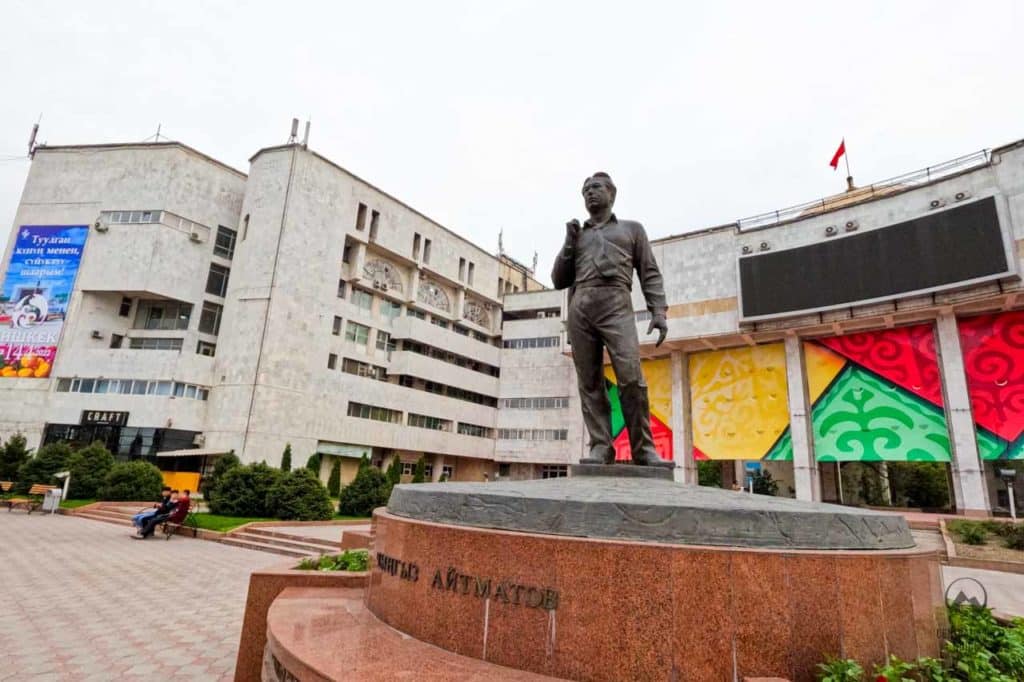
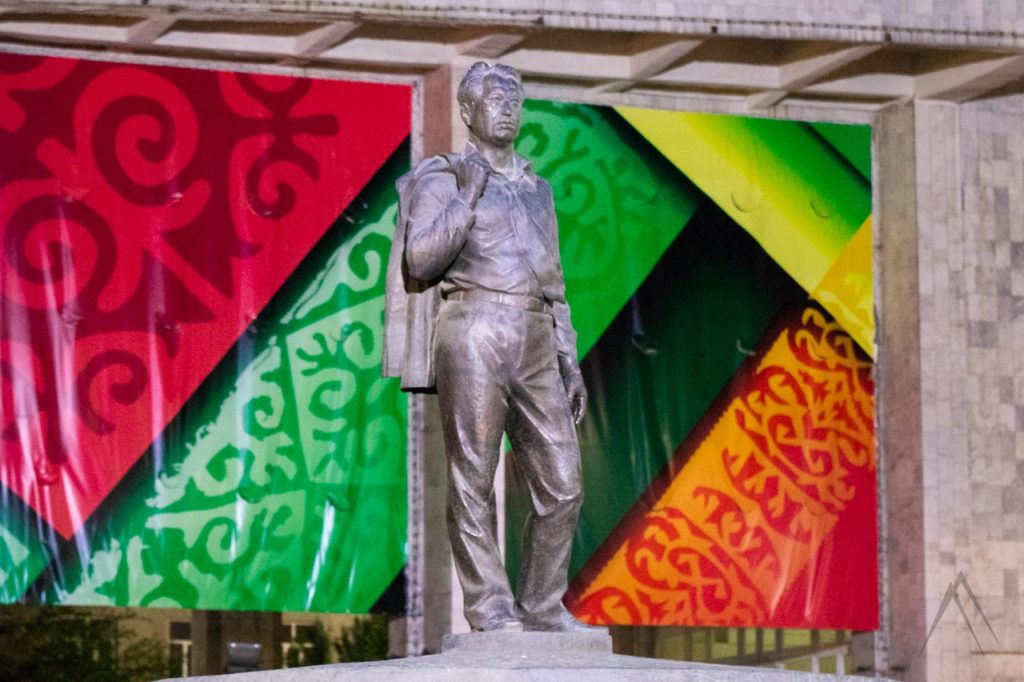
Aitmatov was the winner of numerous prizes in the Soviet Union and he always played an active part in public life. From 1964 to 1985 Aitmatov was Chairman of the Cinema Union of Kyrgyz SSR, and in 1985 he was named Chairman of the Kyrgyz Writers Union. In 1990-1991 he served as an advisor to Mikhail Gorbachev and in 1990 he was appointed as the Soviet Ambassador to Luxemburg.
He served as the Soviet and then Russian ambassador to Belgium from 1990 to 1993. During the 1990s, Chingiz Aitmatov was a member of Kyrgyzstan’s parliament. After independence in 1991, Aitmatov also worked as Kyrgyzstan’s ambassador to European countries Belgium, Netherlands, Luxembourg and France, UNESCO, the European Union, and NATO.
Aitmatov Awards
Works by Aitmatov have received numerous awards, including Soviet-era accolades like the Order of Lenin, the Gold Olive Branch of the Mediterranean Culture Research Center, the Academy Award of the Japanese Institute of Oriental Philosophy, and the Austrian State Prize for European Literature. He was also an academician of the Kyrgyz National Academy (1974) and the Hero of Kyrgyzstan (1997).
In 2008, the writer was hospitalized from the set, where work was done on the film based on the novel “And the day lasts longer than a century”. Aitmatov was diagnosed with acute pneumonia. He was transferred to one of the clinics of Nuremberg. Chingiz Aitmatov died in Germany and is buried near the capital of Kyrgyzstan, in the historical and memorial complex of Ata Beyit. Aitmatov left behind a wife, three sons, and a daughter.
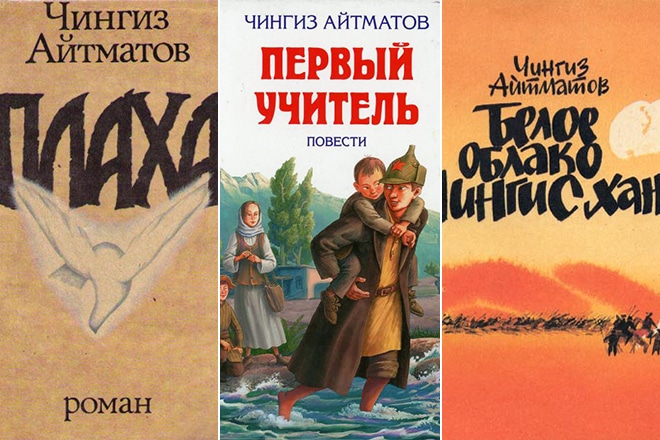
Aitmatov monuments
In addition to his memorial, there is a statue of Aitmatov at a very central location in Bishkek Ala Too square (images above). A new house museum was also opened recently at the southern outskirts of Bishkek where Aitmatov allegedly worked during his career. Not far from magistral, the new southern main street of Bishkek, there is a mural of Aitmatov covering the end of a large block of flats.
Further away from Bishkek, there is a monument park based on the Aitmatov’s characters in Sheker village that was founded in 2000 not far from his museum in his home town. Aitmatov monuments can be also seen during several of our Kyrgyzstan tours and Central Asia Tours. In Issyk Kul, in the town of Cholpon Ata, there is a peculiar destination called Rukh Ordo. There is a statue for Aitmatov there in addition to several paintings and his mausoleum.
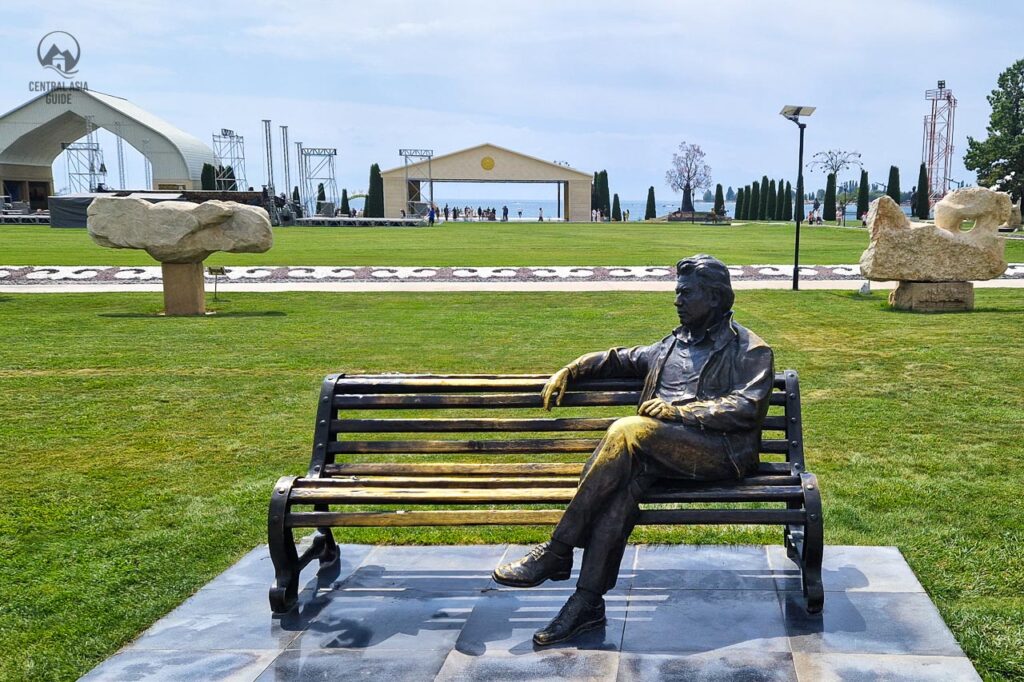
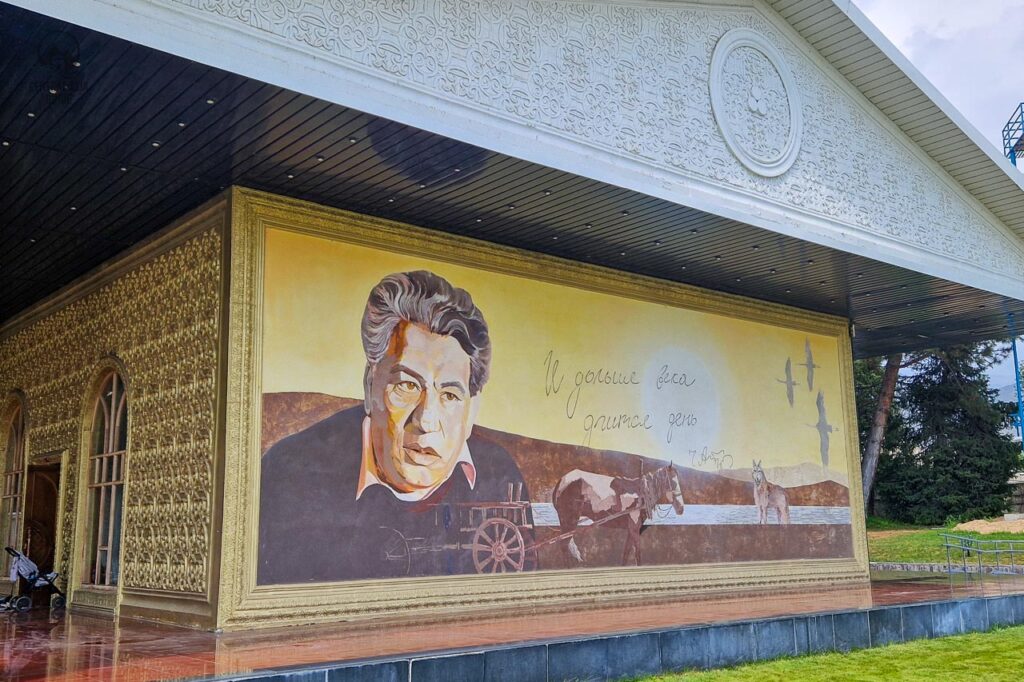
Information related to Aitmatov
Page updated 5.3.2024